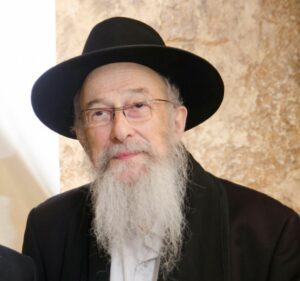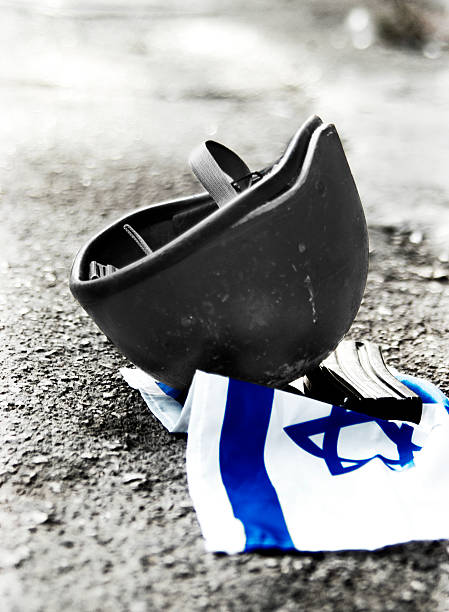Joy, Valor, and Mourning in War
By HaRav Tzvi Yisrael Tau, head of the Har HaMor Yeshiva in Jerusalem.

[This essay is a loose and edited translation of Rabbi Tau’s classes, which can be found, in the original Hebrew, in his book, “Ozar Yisrael B’Givorah.” It is a continuation of the essay “The Meaning of Israel’s War’s.” Any mistakes in the understandings are of the translator’s, Tzvi Fishman, and not those of HaRav Tau.]
The Goal of the Jewish Soldier
The Nation of Israel is unique and set apart from the other nations of the world by the Divine life content which forms the foundation of its being. Therefore, all of its doings are also different, be they secular or holy. This difference applies to its wars and struggles as well, for they all constitute, in their essence, because of who we are, the wars of Hashem, stemming from our inner Holiness and connection to Hashem. This unique Divine mission of our wars bears its stamp on each and every Israeli soldier who participates in them, and is manifest in the willingness to give up his life for Hashem.
Out of this understanding, Rabbi Kook explains the Gemara which states: “Everyone who went out in the wars of the house of David wrote a bill of divorce for his wife,” (Shabbat 56A; See Rabbi Kook’s commentary in “Ein Aya,” on Tractate Shabbat). This enactment is not merely a technical means of assuring that wives will not remain “agunot,” unable to remarry if their husbands become missing in battle. Rather, it expresses a much deeper and meaningful foundation which clarifies the nature of our wars, distinguishing our soldiers from those of the nations (who go off to war when forced by conscription, or in the most idealistic motivations, for the sake of the governments which send them, or to safeguard their own personal lives and the lives of their families which will be enhanced by victory in battle. Rabbi Kook explains that when an Israelite went off to battle, he was not motivated by the calculation to safeguard and improve his own private life. The soldier put it in his mind, in an inner effort to reach a level of high moral fortitude, that he was giving up his private life and joyfully marching off to die a holy hero’s death in a war to sanctify Hashem and lift up the honor of Israel. This is the reason he wrote a bill of divorce to his wife, to sever his heart as much as he could from all family attachment and from personal thoughts and concerns, going forth on a Divine holy mission on behalf of all the Nation.
In the time of war, we are compelled to lay aside the private individual aspect of our lives and to become “tzibori” and “Clal Yisraeli” by identifying with the larger community of Knesset Yisrael and its mission. This revelation of our higher inner content is attained (whether a soldier is conscious of it or not), because it stems from our inner segula (our special uniqueness as the Divinely Chosen Nation). It is something which is independent of our free will. This unique segula is concretely revealed through the willingness for self-sacrifice and the desire to sanctify G-d’s Name (Kiddush Hashem) that can be seen in large segments of the Nation who aren’t even aware of these inner potentials – whether through a lack of religious education, or because of their personal perspectives on life, or because of the shallowness of their conscious recognition. In wartime, the greatness of each individual, the true depth of his life and noble ambitions, overcome the Israeli soldier and dictate all of his deeds.
Joy and Sorrow in War
In explaining how soldiers from the House of David set forth to war, Rabbi Kook notes that they would go forth “with joy to die a hero’s death of holiness and valor in waging a war of Hashem.”
The expression “b’simcha”– joyfully – is seemingly surprising. After all, wars are exceedingly ugly and distasteful. The anguish over the martyrs and victims is also very great – what is the relevance to simcha? The answer is that there is absolutely no contradiction between the differing emotions of anguish and joy during war. The love of Hashem and the love of Israel, which reach their fullest and most supreme expression in the pinnacle of sacrificing one’s life, are filled with joyousness and spiritual transcendence. The joy, needless to say, doesn’t come from the war itself, which, in and of itself, is an evil, ugly, lowly matter, abounding in personal suffering and pain. Rather, the joy comes from the great Kiddush Hashem which fills our emotions and longings, and for which we are prepared to sacrifice all earthy things – this is the joy found in the raising up of the banner of Israel, and in the removal of impurity from the world.
When Israel was at war, Rabbi Tzvi Yehuda Kook was totally filled with a spirit of valor and joy, radiating encouragement and inspiration to his students in the yeshiva, and to those who were going off to battle. His elevated spirit stemmed from his fervent anticipation and yearning to see the glory of the Nation raised on high. When he was told about soldiers who had been killed, he would break out in bitter tears, but after a few passing minutes, a joyous, heroic countenance would settle upon him once again. We could all see his determination in standing strong and joyous throughout the day, in anticipation of the great national salvation which was in the making. He would attend funerals, as much as he was able in his advancing years, and he deeply felt the anguish of the Nation, but, hand in hand with all of the pain, he clung to a higher ideal and to his aspiration to witness G-d’s honor uplifted, along with the honor of Israel. He refused to listen to expressions of weakness at all. When people came to him worried, hounded by depression and despair, he would cry out, “Shmirat HaLashone!” Guard your tongue! When our soldiers were fighting, it was impossible to bring complaints and worries before him, similar to Mattitiyahu’s rebuke of his sons, “You’re shocked and distressed?!” Get thee forth to battle!
At a time of war, we experience all of the terrible suffering and pain of Israel, yet we rise up above this with a feeling of joy over the general Sanctification of G-d which comes to pass through the defeat of the world’s evil doers, and we transcend all depression and despair, all despondency and melancholy spirit.
Even more than this – it is precisely the love of G-d which gives birth to the deepest feeling of pain over the loss of each individual Jewish soul. Our deep connection to the holiness of the Jewish People, the recognition of their lofty stature in this generation of revival, and our love for the honor of G-d which is magnified by their sacrifice, these are the things which bring us to tears and to the deepening of our anguish. Our mourning stems from an encompassing perspective, which appreciates the value of the Nation as a whole, and thus every individual becomes even more important and valued, and his absence pains and anguishes us because it causes a delay in the complete appearance of the full light of our National Soul, and the full light of the Shechinah, the Divine Presence, the wholeness of which is necessary in rectifying the world through the establishment of the Kingdom of G-d over the earth.
However, in spite of our feelings of deep sorrow when Jewish soldiers are killed, with heartfelt courage and clear recognition that everything is a necessary part in bringing G-d’s plan for Redemption to completion, we are happy over the Kiddush Hashem which increases and manifests itself in the eyes of those who care to see. “In the destruction of the wicked there is joy.”
It is important to emphasize that all delays (such as losses in battle or divisions of our Land) merely seem that way on the surface. The essential, pre-determined desire of Hashem to bring about the Redemption; the unalterable fact of the eternity of Am Yisrael and our destined Salvation, these are certainties which cannot be curtailed. Whatever appears to be in our eyes a setback and a delay is, in the depths of truth, serving to assist the appearance of G-d’s wholeness in the world. Nonetheless, the ideal is that these things come to pass in front of everyone’s eyes, in a clearly beneficiary manner, so that it will no longer be necessary to receive G-d’s goodness in a complicated fashion, which refines and cleanses through sufferings in order to advance us toward perfection.
Rabbi Kook calls on us to remember that the Clal (overall Community of Israel) must always be infinitely elevated over the prat (individual), and that it is forbidden to divorce oneself from the community for the sake of the individual, even in cases of personal loss and mourning. On the contrary, the essential principle must be to elevate the individual and include him within the overall collective, as the Rambam writes in a letter: “A person should always look to well-being of the general community, and not look to his own private interests.” Therefore, personal sorrow does not have the power to weaken, G-d forbid, or darken, even any small sliver of the great light of our all-encompassing love for our Nation. This all-encompassing union and identity with the needs, desires, aspirations, and goals of Clal Yisrael comes precisely from the love of G-d, Blessed Be He, and the joy of His Salvation.






